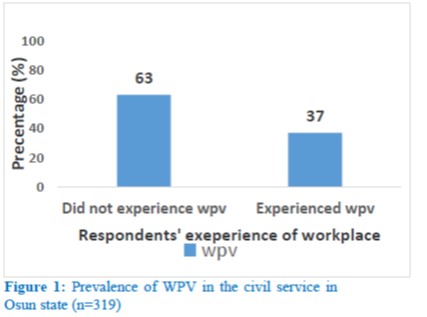Prevalence and Determinants of Work Place Violence among Civil Servants in Osogbo, Nigeria
Keywords:
Workplace violence, Verbal abuse, Civil Servants, StressAbstract
Introduction: Violence is a universal phenomenon that occurs virtually in all settings where there is human interaction. The civil service represents a conglomeration of individuals with diverse backgrounds working with government establishments and with varying degrees of interactions. The aim of this study was to assess the prevalence and determinants of workplace violence among civil servants in Osun State.
Methods: This cross-sectional study was conducted among 319 civil servants. Study participants were selected via multistage sampling method. Relevant information was obtained via a semi-structured questionnaire. Pertinent analyses were done using univariate, bivariate and multivariate approaches.
Results: The mean age of the respondents was 38years (±9.45), with 49.8% of them being females. The overall prevalence of workplace violence was 37%. Verbal abuse (35.1%), was the commonest form of workplace violence experienced. More male respondents perpetrated all forms of violence notably verbal abuse (11.3%) compared to their female counterparts (3.8%). At the logistic regressions stage, stress was statistically significant as the predictive factor for experiencing violence both as a victim and as a perpetrator.
Conclusion: Workplace violence is prevalent among civil servants in Osun State. Additionally, stress was discovered to be the major factor causing workplace violence. This is probably as a result of poor working conditions. Therefore, the government needs to provide the enabling environment that will improve the working conditions in the civil service.
References
Bureau JS, Gagné M, Morin AJS, Mageau GA. Transformational Leadership and Incivility: A Multilevel and Longitudinal Test. J Interpers Violence. 2021; 36:NP448–NP473. doi:10.1177/0886260517734219
Wurim D. Workplace Violence and the Cost-Benefit Trade Off of Zero-Tolerance Safety Policies in Central Nigerian Hospitals. Int J Bus Soc Sci. 2013; 4:222–228.
Parzefall MR, Salin DM. Perceptions of and reactions to workplace bullying: A social exchange perspective. Hum Relat. 2010; 63:761–780. doi:10.1177/0018726709345043
D’Cruz P, Noronha E. Ambivalence: Employee responses to depersonalized bullying at work. Econ Ind Democr. 2015; 36:123–145. doi:10.1007/978-81-322-2044-2
Salin D. Risk factors of workplace bullying for men and women: The role of the psychosocial and physical work environment. Scand J Psychol. 2015; 56:69–77. doi:10.1111/sjop.12169
Giorgi G. Workplace Bullying in Academia Creates a Negative Work Environment. An Italian Study. Empl Responsib Rights J. 2012; 24:261–275. doi:10.1007/s10672-012-9193-7
Fayankinnu EA. Nigerian women prison workers’ experiences of workplace violence. African Study Monographs. 2010; 31:1-15.
Best JM. Violence in the Workplace: Impact on Workers and Employers and the Role of the Occupational and Environmental Health Nurse. (Master’s Paper submitted to the Faculty of the University of North Carolina at Chapel Hill, 2009).
Howard JL. Employee awareness of workplace violence policies and perceptions for addressing perpetrators at Colleges and Universities. Empl Responsib Rights J. 2009; 21:7–19. doi:10.1007/s10672-008-9087-x
Gacki-Smith J, Juarez AM, Boyett L, Homeyer C, Robinson L, MacLean SL. Violence Against Nurses Working in US Emergency Departments. J Nurs Adm. 2009; 39:340–349.
Rasha SK. Prevalence and risk factors of workplace violence against health care workers in emergency department in Ismailia, Egypt. Pan Afr Med J. 2017; 26:1–8. doi:10.11604/pamj.2017.26.21.10837
Xu T, Hanson LLM, Lange T, Starkopf L, Westerlund H, Madson IEH, et al. Workplace bullying and violence as risk factors for type 2 diabetes: a multicohort study and meta-analysis. Diabetologia. 2018; 61:75–83.
World Health Organization. Global status report on violence prevention. 2014. https://apps.who.int/iris/handle/10665/145086
Giorgi G. Workplace Bullying in Academia Creates a Negative Work Environment. An Italian Study. Empl Responsib Rights J. 2012; 24:261–275.
Godkin L. An Epidemicological Approach to Workplace Bullying. J Leadership Accountability Ethics. 2015; 12:76–91.
Tiruneh BT, Bifftu BB, Tumebo AA, Kelkay MM. Prevalence of workplace violence in Northwest Ethiopia : a multivariate analysis. BMC Nurs. 2016; 15:42 doi:10.1186/s12912-016-0162-6
Omisore AG, Omisore B, Adelekan B, Afolabi OT, Olajide FO, Arije OO, et al. A comparative study of school based violence and strategies for control in public and private secondary schools in Osun State. Nig J Med. 2015; 21:81-88.
Lamontagne A, Ostry A. Job Stress & Health : A Review of the Epidemiologic Evidence. in Workplace Stress in Victoria: Developing a Systems Approach. Victorian Health Promotion Foundation . 2014; 1–19.
Ferris DL, Spence JR, Brown DJ, Heller D. Interpersonal Injustice and Workplace Deviance: The Role of Esteem Threat. J Manag. 2012; 38:1788–1811. doi:10.1177/0149206310372259
Olufunmilayo A, Ajibola I. Organisational factors predicting perceived workplace violence among nurses in Ondo and Osun states, Nigeria. Afr J Psychol Study Social Iss. 2018; 21:48-57.
Stouten J, Baillien E, Van den Broeck A, Camps J, De Witte H, Euwema M. Discouraging Bullying: The Role of Ethical Leadership and its Effects on the Work Environment. J Bus Ethics. 2010; 95:17–27.

Downloads
Published
How to Cite
Issue
Section
License
Copyright (c) 2023 Western Nigeria Journal of Medical Sciences

This work is licensed under a Creative Commons Attribution-NonCommercial-NoDerivatives 4.0 International License.


